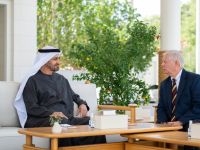Dubai Health Authority at the Heart of Breakthrough Medicine
The Dubai Health Authority (DHA) is at the forefront of the latest advances in healthcare following its participation in an innovative procedure to treat blocked coronary arteries. The new therapy, which was undertaken for the first time at Dubai Hospital and Rashid Hospital last week, is deemed so groundbreaking that it has been hailed the ‘Fourth Revolution’ in the field of cardiology. The DHA is the first health entity in the Middle East and Africa to offer the new therapy, putting the DHA firmly on the map for breakthrough advances in healthcare.
The new therapy that was performed is titled ‘ABSORB’ and involves the insertion of a bioresorbable scaffold into an affected coronary artery to keep it open and thereby promote the flow of blood and oxygen to the heart. The procedure is similar to the existing technique that places a ‘stent’ into a diseased artery, but with one crucial difference. Whereas the stent is a permanent fixture that remains in the blood vessel, making the vessel similar to a cage, the scaffold progressively dissolves over a period of two years, leaving the artery widened but with no trace of the device left.
“The DHA is very pleased to be able to participate in the ABSORB program, which promises to revolutionise the treatment of coronary artery disease over the coming years,” said His Excellency Khalid Al Sheikh Mubarak, Deputy Director-General at the DHA. “The first ever ABSORB procedure for the Middle East and Africa was successfully undertaken at Dubai and Rashid Hospital and this auspicious event heralds the start of a new chapter in the treatment of heart disease in the region. Thanks to the foresight of His Highness Sheikh Mohammed bin Rashid Al Maktoum, UAE Vice-President, Prime Minister and Ruler of Dubai, who is determined to reduce the social and economic burden of heart disease in the UAE, the DHA is now playing a leading role in new forms of treatment for this condition, which is currently the number one cause of death in the country,” he added.
The first ever insertion of an Abbott ABSORB scaffold device in the Middle East and Africa took place at Dubai Hospital’s Heart Center and was performed by Dr. Talib K. Majwal, Consultant, Interventional Cardiology & Director of Interventional Cardiology, Dubai Heart Center, Dubai Hospital and Dr. Fahad Baslaib, Consultant Interventional Cardiologist and Director of Rashid Hospital’s Cardiology Department. The procedure took about twenty minutes, with the patient remaining conscious throughout.
“In terms of insertion technique, the ABSORB scaffold procedure is much the same as placing a stent in an affected artery, so there was no need to learn a major new set of skills for this new treatment paradigm,” said Dr. Majwal. “Although the insertion technique is the same, the huge advantage that this scaffold has over a stent is that over a period of two years it dissolves into harmless gas and water, leaving the coronary artery free of any foreign object. This allows the artery to flex and pulsate, which is better for blood flow than having a restrictive permanent stent that turns the vessel into an inflexible cage and inhibits artery movement,” he added.
The term ‘Fourth Revolution’ that has been applied to the ABSORB scaffold procedure follows its recognition as a groundbreaking form of treatment for coronary artery disease. It is the latest development that has seen a linear progression from the ‘First Revolution,’ which was coronary angioplasty using a balloon to widen the affected artery, the ‘Second Revolution,’ which was the use of a permanent metal stent to unblock an artery and the ‘Third Revolution,’ which incorporated drugs built into a stent to be gradually released over time.
“The ABSORB bioresorbable scaffold offers numerous benefits over metal stents, so it can be considered as a whole new treatment paradigm in its own right,” said Dr. Fahad Baslaib. “The ABSORB procedure is particularly beneficial for younger patients, as there is the option for further forms of treatment in the future – something that the insertion of a metal stent precludes. This is especially significant for the UAE, as the average age that people start to experience heart problems here is 45 years of age, which is 10 to 15 years younger than in Europe," he added.
Background Information
Dubai Health Authority
The Dubai Health Authority (DHA) was created, in June 2007, by Law 13 issued by His Highness Sheikh Mohammed bin Rashid Al Maktoum, Vice President and Prime Minister of the UAE, Ruler of Dubai, with an expanded vision to include strategic oversight for the complete health sector in Dubai and enhance private sector engagement. His Highness Sheikh Hamdan Bin Rashid Al Maktoum, Deputy Ruler of Dubai and UAE Minister of Finance is the President of the Dubai Health Authority and His Excellency Humaid Mohammed Obaid Al Qutami is the chairman of the board of the Dubai Health Authority.





